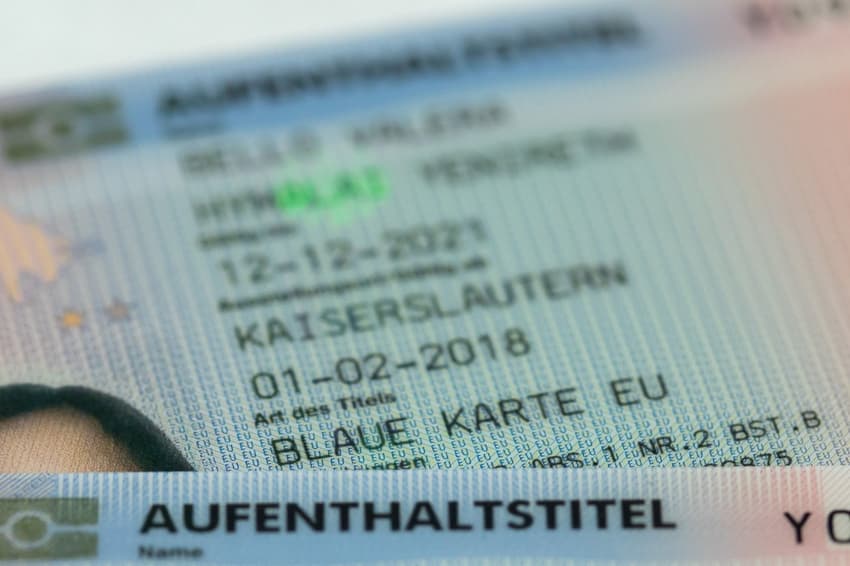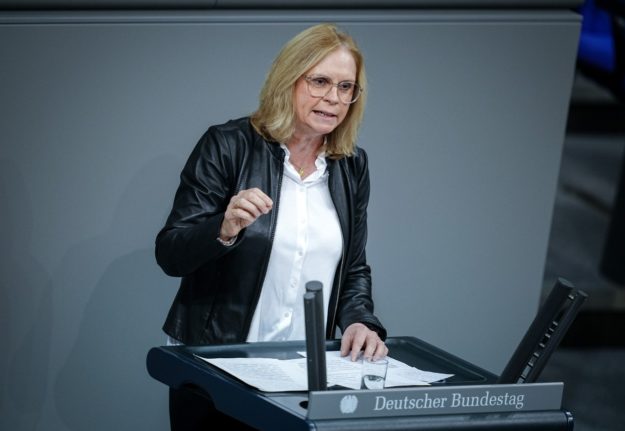German Bundestag passes sweeping immigration reforms bill

After a heated debate in the Bundestag on Friday, German MPs have voted through a number of wide-ranging reforms to immigration that will make it easier for skilled workers to enter the country.
In the vote on Friday morning, the three traffic-light coalition parties of the Social Democrats (SPD), Greens and Free Democrats (FDP) voted for the reforms, while the centre-right CDU/CSU parties and the far-right Alternative for Germany (AfD) voted against.
The left-leaning Linke abstained.
Once the bill is passed in the Bundesrat - Germany's upper house of parliament - it will create several new immigration routes for people with qualifications, including a new point-based visa that would allow people to enter Germany to look for work.
To be eligible for the so-called 'Chancenkarte' or Opportunity Card, foreigners will need to accrue at least six points out of 10 on things like German or English language skills, professional qualifications and experience, age and links to Germany.
As well as the points-based visa, a number of other changes are also intended to reduce bureaucracy for would-be migrants.
These include reducing the salary threshold for people entering Germany on a Blue Card to €3,500 gross per month and enabling IT workers to move to Germany with work experience rather than a degree.
Speaking in the Bundestag on Friday morning, Interior Minister Nancy Faeser (SPD) said Germany was on track to introduce "the most modern immigration law in the world" and was following the example of countries like the US, Canada and Australia.
PODCAST: How Brexit has hit Brits in Germany and immigration changes
"This is a genuine change and a genuine improvement," she added.
Sharp criticism came from the centre-right CDU, however, with deputy parliamentary chair Andrea Lindholz describing the reforms as a "sham".
Lindholz admitted that Germany would require workers from abroad to fill the some 1.7 million vacant positions in the German job market. However, she said, the government's bill "would above all result in the immigration of unqualified workers".

CDU deputy parliamentary leader Andrea Lindholz speaks out against the "right of opportunity" law in the Bundestag. Photo: picture alliance/dpa | Kay Nietfeld
In particular, the CDU politician slammed the fact that the German language level required to apply for the Chancenkarte had been reduced to A1, which requires just 300 words of active vocabulary.
The points-based system would create a "bureaucratic monster", Lindholz said. "It's not modern, it's false advertising."
READ ALSO: Germany set to introduce one of the most modern immigration laws in the world
The parliamentary director of the FDP parliamentary group, Johannes Vogel, said the reforms would put Germany on an equal footing with other successful immigration countries. "With new minds come new ideas," he added.
Meanwhile, Gökay Akbulutsaid from Die Linke said it was good that skilled workers would be able to bring their parents and parents-in-law to live with them in future, even without proof of residence.
However, the fact that working migrants without special qualifications are not allowed to do so is "a two-class migration policy", she added, explaining a key reason for the party's abstention.
Comments (1)
See Also
In the vote on Friday morning, the three traffic-light coalition parties of the Social Democrats (SPD), Greens and Free Democrats (FDP) voted for the reforms, while the centre-right CDU/CSU parties and the far-right Alternative for Germany (AfD) voted against.
The left-leaning Linke abstained.
Once the bill is passed in the Bundesrat - Germany's upper house of parliament - it will create several new immigration routes for people with qualifications, including a new point-based visa that would allow people to enter Germany to look for work.
To be eligible for the so-called 'Chancenkarte' or Opportunity Card, foreigners will need to accrue at least six points out of 10 on things like German or English language skills, professional qualifications and experience, age and links to Germany.
As well as the points-based visa, a number of other changes are also intended to reduce bureaucracy for would-be migrants.
These include reducing the salary threshold for people entering Germany on a Blue Card to €3,500 gross per month and enabling IT workers to move to Germany with work experience rather than a degree.
Speaking in the Bundestag on Friday morning, Interior Minister Nancy Faeser (SPD) said Germany was on track to introduce "the most modern immigration law in the world" and was following the example of countries like the US, Canada and Australia.
PODCAST: How Brexit has hit Brits in Germany and immigration changes
"This is a genuine change and a genuine improvement," she added.
Sharp criticism came from the centre-right CDU, however, with deputy parliamentary chair Andrea Lindholz describing the reforms as a "sham".
Lindholz admitted that Germany would require workers from abroad to fill the some 1.7 million vacant positions in the German job market. However, she said, the government's bill "would above all result in the immigration of unqualified workers".

In particular, the CDU politician slammed the fact that the German language level required to apply for the Chancenkarte had been reduced to A1, which requires just 300 words of active vocabulary.
The points-based system would create a "bureaucratic monster", Lindholz said. "It's not modern, it's false advertising."
READ ALSO: Germany set to introduce one of the most modern immigration laws in the world
The parliamentary director of the FDP parliamentary group, Johannes Vogel, said the reforms would put Germany on an equal footing with other successful immigration countries. "With new minds come new ideas," he added.
Meanwhile, Gökay Akbulutsaid from Die Linke said it was good that skilled workers would be able to bring their parents and parents-in-law to live with them in future, even without proof of residence.
However, the fact that working migrants without special qualifications are not allowed to do so is "a two-class migration policy", she added, explaining a key reason for the party's abstention.
Join the conversation in our comments section below. Share your own views and experience and if you have a question or suggestion for our journalists then email us at [email protected].
Please keep comments civil, constructive and on topic – and make sure to read our terms of use before getting involved.
Please log in here to leave a comment.